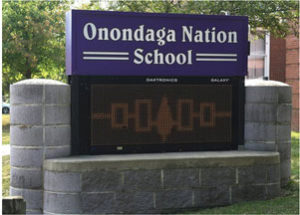
LaFayette, NY — Gaweñnahawi’s, the recently formalized Onondaga Nation Education Advisory Committee, addressed the LaFayette School Board for the first time on July 20, 2017, bringing hopes, concerns, and guidelines for effective consultation. The Committee was convened in June to address the many problems faced by the Onondaga Nation School, which is currently run by the LaFayette School District under contract with New York State, under longstanding treaty agreements that provide for the welfare of the Onondaga people.
The goal of Gaweñnahawi’s is to respectfully develop and sustain a healthy relationship between the sovereign Onondaga Nation and the LaFayette Central School District; Gaweñnahawi’s is responsible for all negotiations regarding contract and budget matters pertaining to the Onondaga Nation community. Gaweñnahawi’s will promote a strong, unified voice of the Onondaga Nation and Onondaga Nation Council of Chiefs.
 Gaweñnahawi’s will be the point of contact on behalf of the sovereign Onondaga Nation in all consultation requirements regarding educational matters. Gaweñnahawi’s will fairly advocate on behalf of the Onondaga Nation community; promote Onondaga Nation culture, language, and history; communicate and inform The Onondaga Council of Chiefs and community on a regular basis; and communicate, inform, and collaborate with representatives of the LaFayette Central School District and The New York State Education Department.
Gaweñnahawi’s will be the point of contact on behalf of the sovereign Onondaga Nation in all consultation requirements regarding educational matters. Gaweñnahawi’s will fairly advocate on behalf of the Onondaga Nation community; promote Onondaga Nation culture, language, and history; communicate and inform The Onondaga Council of Chiefs and community on a regular basis; and communicate, inform, and collaborate with representatives of the LaFayette Central School District and The New York State Education Department.
Committee members include Onondaga Nation School PTS President Ashley Bennett, Lorena Coulon, Clan Mother Wendy Gonyea, Alson Gibson, Joyce Lewis, Ryan Lewis, Sue Parsons, Aweñheeyoh Powless, Faithkeeper Nancy Powless, Clan Mother Jozetta Skye, Steve Thomas, and Edye Waterman. Many of those on the committee have a background in education or have children within the school system.
Aweñheehyoh Powless delivered the attached statement to the LaFayette School Board, calling for full and proper consultation around matters pertaining to the Onondaga Nation School and Onondaga students within the district.
“Telling us what you have already decided to do is not consultation,” explained Alson Gibson. “True consultation looks like meeting as equals to discuss the options for our children, and to incorporate our advice. Great historic harms have come from well-intentioned people unilaterally making decisions they claim are in our best interests, which history has ultimately shown to be destructive. We want what we hope you want: a better future for our children.”
